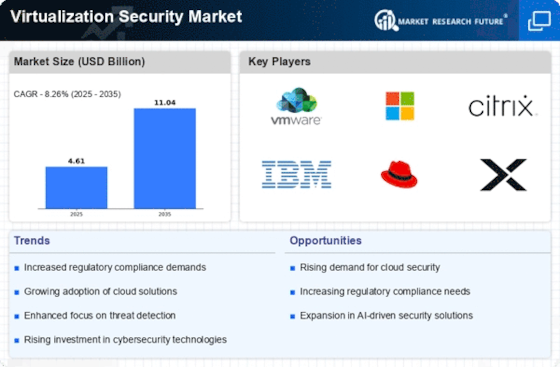Top Industry Leaders in the Virtualization Security Market

Navigating the Virtualized Jungle: A Look at the Competitive Landscape of Virtualization Security
The burgeoning virtualization security market, expected to reach a colossal growth by 2030, offers fertile ground for established players and nimble newcomers alike. As organizations increasingly embrace virtualized environments, securing these complex ecosystems becomes paramount, fueling intense competition amongst providers.
Key Players:
- Oracle Corporation (US)
- Juniper Networks Inc. (US)
- VMware Inc. (US)
- Ericsson Networks (Sweden)
- Trend Micro Inc. (Japan)
- CA Technologies (US)
- Sophos Ltd (UK)
- Intel Security Group (US)
- Altor Networks (US)
Strategies for Success:
-
Holistic Approach: Moving beyond point solutions, players are offering comprehensive suites encompassing workload security, network security, data security, and threat detection for virtualized environments.
-
Integration and Automation: Seamless integration with existing security tools and automation capabilities are crucial for efficient management and incident response in complex virtual networks.
-
Cloud-Native Focus: Developing cloud-native security solutions with scalability, elasticity, and pay-as-you-go models is essential for catering to cloud-based virtual deployments.
-
AI and Machine Learning Integration: Leveraging AI and machine learning for intelligent threat detection, anomaly identification, and automated remediation strengthens security posture.
Factors for Market Share Analysis:
-
Target Market: Focusing on specific industry verticals or cloud platforms allows for deeper tailoring and market penetration.
-
Feature Set and Functionality: The breadth and depth of security features offered, covering critical vulnerabilities like lateral movement, data breaches, and malware propagation, impacts competitiveness.
-
Ease of Deployment and Management: User-friendly interfaces, automated configuration options, and integration with existing infrastructure are crucial for ease of adoption.
-
Pricing and Licensing Models: Flexible pricing models, subscription options, and attractive licensing terms, especially for smaller businesses, are key considerations.
New and Emerging Companies:
The constant influx of young and innovative companies brings fresh perspectives and agility to the market. Some notable examples include:
-
Acalvio: Offering workload micro-segmentation solutions for granular control and isolation within virtual environments.
-
Vectra Networks: Focusing on threat detection and response specifically for cloud-based workloads and containerized applications.
-
Deepwatch: Specializing in security for hybrid and multi-cloud environments, enabling unified visibility and threat management across diverse infrastructures.
Current Investment Trends:
Investment in the virtualization security market is robust, with both established players and venture capitalists recognizing its high growth potential. Key areas of focus include:
-
AI and Machine Learning Integration: Embracing AI for advanced threat detection, anomaly identification, and automated incident response.
-
Zero-Trust Security: Implementing zero-trust architectures for least-privilege access control and comprehensive identity verification within virtual environments.
-
Container Security: Addressing the unique security challenges of containerized applications and Kubernetes environments.
-
Cloud-Native Security Solutions: Developing security platforms specifically designed for cloud-based virtualized infrastructure.
Latest Company Updates:
-
Jan 4, 2024: TechTarget: Industry experts warn of rising insider threats in virtualized environments, urging for stricter access controls and data encryption. -
Dec 29, 2023: VMware: Announces new security offering - VMware Aria Guard - focused on runtime threat detection and workload protection for containerized applications. -
Jan 2, 2024: ZDNet: Trend Micro unveils AI-powered solution for automated detection and mitigation of vulnerabilities in virtualized systems.










